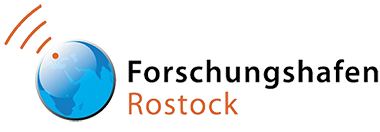The Research Port Rostock is an initiative of the government of Mecklenburg-Vorpommern in close cooperation with the regional industry, universities and research establishments. The initial phase was started in 2007. Since that time it has been pursuing to open up the potential of new systems and services for safe, secure and efficient seafaring with a specific focus on ship’s command, navigation, traffic management and logistics. Therefore maritime test facilities can be used to study, investigate, develop, validate and demonstrate assistance systems and services under preferably real conditions.
With respect to the R&D activities of the federal state Mecklenburg-Vorpommern the Research Port unites the maritime competences of the University of Applied Sciences Wismar (Department of Maritime Studies as well as the Institute of Innovative Ship Simulation and Maritime Systems ISSIMS), the Schifffahrtsinstitut Warnemünde e.V., the Institute of Automation of the University of Rostock and Institute of Communications and Navigation (Department Nautical Systems) of the German Aerospace Center. A specific interest of the Research Port is led on the evolution of Global Navigation Satellite Systems (GNSS). Here primary new opportunities and applications within the scope of the development of the European contribution to GNSS – the Galileo system – are in focus to set innovative impulses by using different test facilities for the evaluation of dedicated systems and services.
Beside these options for use the Research Port was also established as a focal point for the acquisition and execution of innovative R&D projects. Here all levels of research and development including fundamental research, applied research, prototyping, approval procedures, standardization up to the industrial application and commercialization of products and services are in mind. A very strong focus is led on joint research projects between Research Institutes and SME respectively industrial companies. Such projects open the door for a common work on topics with a clear strategic line for social and economic interests. Moreover this forms to quickly tap into the market potential.
The topics, which were addressed by projects of the Research Port until now cover:
- Systems for high precise and reliable Positioning and Navigation in Ports and at Sea
- Automated control and guidance systems, supporting the mariner
- under bad weather conditions (fog, rain, snow),
- in critical traffic situations and for high traffic density,
- under high speed conditions and by fast movement change.
- Support functionalities for vessel monitoring and control as for instance
- Situation awareness (local and regional)
- Decision support (for autonomous and cooperative activities)
- Assistance systems to support manual control processes, semi-automatic and automatic systems
